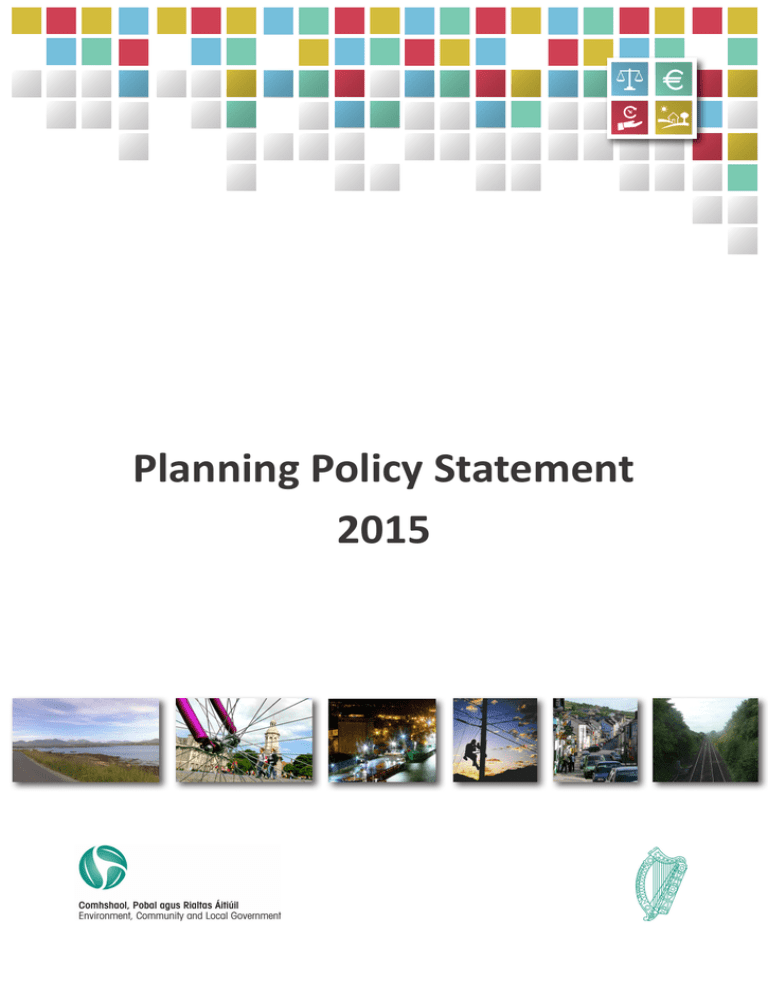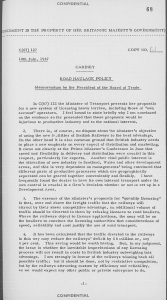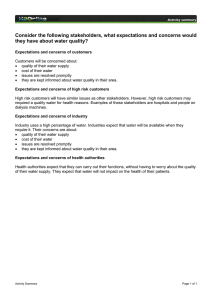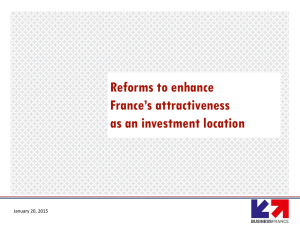Planning Policy Statement 2015 - Department of Housing, Planning
advertisement

Planning Policy Statement 2015 Introduction It is just over 50 years since national planning legislation was first implemented in Ireland. The Government wishes to reaffirm its strong belief in the value of a forward-looking, visionary and dynamic planning process because it will ensure that the right development takes place in the right locations and at the right time and in providing the social, economic and physical infrastructure necessary to meet the needs of our people in a way that protects the many qualities of our natural and built environment. The Government believes that the planning process must provide: - Opportunities for communities to help shape the future of their areas; - Effective co-ordination in the work of local authorities and other public bodies; and - Clear guidance to potential developers in securing public policy aims. Planning has a critical balancing role to play when competing interests put forward differing views on future development options. By focusing on the interests of the common good for proper planning and long-term sustainable development, the planning system can arrive at equitable, balanced and transparent decisions on the best way forward. The Government has prepared this non-statutory Planning Policy Statement to set out: (1) Key principles that it expects planning authorities, other public bodies and those that engage with the planning process will observe; and (2) High level priorities for the continued enhancement of the planning system in Ireland. The Government will review and update this statement from time to time. 1 Key Principles Planning legislation in Ireland seeks to ensure, in the interests of the common good, the proper planning and sustainable development of urban and rural areas. The Government believes that the following 10 key principles should be used as a strategic guide in implementing the aim above. 1. Planning must be plan-led and evidence based so that at the appropriate level, from the National Spatial Strategy, Regional Spatial and Economic Strategies, City and County Development Plans and Local Area Plans, the Government, local authorities and local communities, work together to set out a cohesive vision for the future of our country. 2. Planning must proactively drive and support sustainable development, integrating consideration of its economic, social and environmental aspects at the earliest stage to deliver the homes, business and employment space, infrastructure and thriving urban and rural locations in an economically viable manner that will sustain recovery and our future prosperity. 3. Planning is about creating communities and further developing existing communities in a sustainable manner by securing high quality urban design through the design, delivery and co-ordination of new development providing a good quality of life for all existing and future users of land and buildings. 4. Planning must support the transition to a low carbon future and adapt to a changing climate taking full account of flood risk and facilitating, as appropriate, the use of renewable resources, particularly the development of alternative indigenous energy resources. 5. Planning must ensure that development facilitates and encourages greater use of public transport as well as making walking and cycling more attractive for people in support of active and healthy lifestyles by focusing development, whenever possible, at locations with more sustainable travel options. 6. Planning will encourage the most efficient and effective use of previously developed (brownfield) land over the use of greenfield land to ensure the most efficient use of existing infrastructure, enhancing and strengthening the continued vitality of existing communities through regeneration. 7. Planning will enhance a sense of place within and between cities, towns and villages and rural areas by recognising their intrinsic character and individual qualities and implement actions to protect and enhance that character and those qualities. 8. Planning will conserve and enhance the rich qualities of natural and cultural heritage of Ireland in a manner appropriate to their significance, from statutorily designated sites to sites of local importance, and including the conservation and management of landscape quality to the maximum extent possible, so that these intrinsic qualities of our country can be enjoyed for their collective contribution to the quality of life of this and future generations. 9. Planning will support the protection and enhancement of environmental quality in a manner consistent with the requirements of relevant national and European standards by guiding development towards optimal locations from the perspective of ensuring high standards of water and air quality, biodiversity and the minimisation of pollution risk. 10.Above all, planning will be conducted in a manner that affords a high level of confidence in the openness, fairness, professionalism and efficiency of the process, where people have the opportunity to participate at both the strategic plan making and individual planning application level with decisions always being taken in the interests of the common good and in a timely and informed fashion and where people can have confidence that appropriate enforcement action will be taken where legal requirements are not upheld. 2 Key Priorities To ensure that the planning process is properly enabled to deliver on the key principles outlined above, the Government will be guided by the following key priorities for the development of planning in Ireland. 1. Maintaining High Standards of Public Confidence Ireland’s planning system has evolved steadily over the past 50 years. In 2012, key statistics from the operation of the system are as follows: - Planning was guided by the National Spatial Strategy, seven Regional Planning Guidelines, 34 City and County Development Plans and over 350 local area plans, which are updated every 6 years; - 20,343 planning applications were considered by planning authorities in the context of the plans above, 90% of which were approved and this compared to an all-time peak of 92,651 in 2006; - 7% of applications were appealed to An Bord Pleanála who either confirmed or varied the decision of the local authority in 50.9% of cases or reversed 49.1% of cases; - Housing applications are the most common form of applications (29.2%) followed by extensions to dwellings (36.7%) and commercial and industrial applications (13%); - Planning authorities took enforcement steps in 2492 cases varying from enforcement notices to legal cases and obtained 119 convictions for breaches of planning requirements; - Development contributions of €78m were paid to planning authorities in respect of the provision of essential infrastructure such as new public transport systems, local roads footpaths, cycle-paths and public lighting, parks and amenities, water services and community facilities; - Planning application fees yielded €7.7m revenue to local authorities to run a system which employed 1,343 staff of which 227 were professional and technical staff. The vast majority of the many aspects of Ireland’s planning processes are carried out effectively and within a highly open and transparent decision making context. Safeguards to ensure that fairness and transparency include: - Public participation at every stage of development plan and local area plan making, which are ultimately approved by democratically elected local politicians; - Public participation at every stage of decision making on planning applications including an independent planning appeals board – An Bord Pleanála with certain third party appeal rights; - Availability of a range of enforcement provisions when appropriate; - Access to the courts to review decisions on points of law; and - The Ombudsman’s office on administrative fairness matters and the Standards in Public Office (SIPO) organisation in relation to matters of ethics and standards in public office. Nevertheless, some aspects of Irelands planning process have come in for close scrutiny in recent years through the work of the Mahon Tribunal and through some reviews of practices and procedures in planning authorities. 3 Key Priorities Generally the planning process operates fairly, efficiently and transparently, but the circumstances in which it operates are constantly evolving and further improvements must be continually made to ensure that these remain its hallmarks. It is also important to ensure that citizens understand planning and its processes, through the availability of accessible information and that the public knows how to engage effectively with this process in the interest of the common good and of facilitating sustainable development. Notwithstanding the wide array of bodies that can and do supervise the planning process, the Government is bringing forward legislative proposals to address the recommendations of the Mahon Tribunal by further improving oversight of the policy making and service delivery aspects of the system. Establishment of the Office for Planning Regulation A centre-piece of forthcoming legislation will be the establishment of the Office of the Planning Regulator. The role of the Regulator will be to: 4 - Maintain an overview of all regional strategies and city and county development plans and local area plans as they are being made, to ensure they are in compliance with, as relevant, national and regional planning policies and guidelines; - Publish such analysis and advice the regulator may give to the Minister on any actions required where aspects of such plans are at variance with the fundamental principles of planning and key national and or regional policy objectives; - Undertaking reviews of the operation of planning authorities in relation to functions under the OPR remit; and - Supporting education and training, including for local authority members, on planning policy and practice matters to ensure high standards in these areas. Key Priorities 2. Planning and Economic Recovery One of the overarching priorities of Government is to facilitate job creation as part of the overall national effort to secure sustainable economic recovery. Planning is central to securing sustainable development, sustainable economic activity and ultimately jobs. Construction 2020 Construction 2020: A strategy for a renewed construction sector (2014) recognises that a fit for purpose, flexible and effective planning system is a vital support to a properly functioning construction and development sector and to the wider economy. The strategy sets out 14 actions under headings which will provide both the certainty and flexibility required to support recovery. Active Land Management by Planning Authorities Preparation of development plans is only an initial step. Plan implementation is key and the actions in Construction 2020 will be progressed to enable planning authorities to more dynamically lead and manage the development process in their areas, ensuring that land zoned for development actually comes into use as anticipated in development plans and in tandem with supporting infrastructure. The enhanced role of planning authorities in managing the development and use of land in their areas will complement their expanded role in economic development set out in Putting People First, providing the tools for local authorities to strongly support local economic development which facilitates overall national economic recovery. National Planning Framework A new national planning framework will be developed to provide the context for national spatial planning for the next decade and beyond. This will involve reshaping and focusing our national spatial strategy to meet today’s and tomorrow’s challenges. The new framework will: - Identify national priorities with regard to future employment growth and development; - Distinguish between the role of the larger cities in acting as our major international players and our regional towns in extending the influence of the cities; and - Establish a clear policy framework within which there will be more dynamic participation by rural areas in overall regional development by re-emphasising the contribution from rural based enterprise in food, tourism, natural resource and innovation sectors. 5 Key Priorities This new framework will provide the strategic context for, amongst other matters: - Investment in critical national infrastructure by both the public and private sectors in key areas like housing, transport, energy, water services, communications and waste management; - Planning at regional and local levels for Ireland’s requirements in relation to housing, commercial, office and industrial accommodation; - Preparation of new Regional Economic and Spatial Strategies by the three new Regional Assemblies and the associated enhancement of the economic development focus of local authorities as provided for under the Local Government Reform Act 2014; and - Interactions between the development of Ireland’s land mass and its neighbours in the EU, including our territorial waters through integrated territorial and marine spatial planning. Emergent employment sectors More widely, our planning process will be positioned to facilitate sustainable job creation in many new and emergent sectors, including renewable energy technologies, and enabling urban regeneration and the emergence of new creative clusters within city centre areas. To that end: 6 - An Urban Regeneration Measure will be rolled out as part of the next round of EU structural and regional development funding, matched by Irish investment to create new creative clusters to generate sustainable economic investment and employment in the heart of major cities in need of regeneration; - More effective monitoring systems will be put in place for estimating future development requirements for housing, business and employment to ensure such requirements are being met and not exceeded to the extent that future infrastructure investment requirements would be more difficult to predict and deliver; and - Planning policies for the development of renewable energy and energy infrastructure will be updated to support the transition to a low carbon economy and community acceptance. Key Priorities 3. Enhancing Service Delivery The planning process and its underpinning regulatory and policy framework has become more sophisticated because the wider public has justifiably high expectations of what planning should deliver for their own local areas. As a result, a range of more detailed legislation, guidelines and strategies have been published in recent years, in many cases responding to domestic and international legal obligations. Improved Policy Guidelines Planning authorities and those interacting with the planning process have, in the past few years, had to address a wide range of new policy and legislative requirements, a sample of which includes: - Implementation of EU Directives including the Habitats Directive; - Introduction of Core Strategies under the 2010 Planning and Development Act; - Resolving unfinished housing developments; - Flood risk assessment and management; and - Regularisation of quarries. Users of the planning system, as well as planning authorities and An Bord Pleanála find the various guidelines and guidance documents published by the Minister under Section 28 of the Planning Act and their detailed policy advice very useful in clarifying the decision making process at policy making and application/appeal levels. Key documents such as the guidelines on Development Management and Development Plans are currently in the process of being updated and further guidelines will be developed. Better On-Line Access to Planning Services At the same time, and as part of Action 21 of the Construction 2020 Strategy, the Department of the Environment Community and Local Government is examining what further scope there may be to further streamline and improve the planning application process for example by introducing more online planning services such as on-line planning applications and on-line appeals to An Bord Pleanála as well as an expansion of the www.myplan.ie website which provides an easy and free to use portal to all development plans, local area plans and other useful planning information. Local Government Reform Local government structures have been streamlined in line with the Government’s local government reform agenda, reducing the numbers of planning and regional authorities to more manageable numbers, from 88 planning authorities to 31 and 10 regional bodies to 3 regional assemblies. Finally, performance indicators for local government are being reviewed to ensure more effective measurement of how the planning process will perform into the future. 7 Key Priorities 4. Quality in Planning Outcomes The success of our planning process will be judged by the quality of the places that result variously from, the development of new places, the regeneration of existing places and the protection or enhancement of places that are particularly sensitive because of the natural and/or cultural heritage or environment they contain. The planning process plays a very significant role in promoting patterns of development which help Ireland meet its international obligations by: • tackling the sources of climate change by reducing Ireland’s carbon footprint; • securing less energy and travel intensive development patterns; • facilitating the generation of energy from low carbon sources; and • adapting to the effects of climate change. Government wants to see planning authorities encourage high standards of development in their areas informed by an understanding of the qualities of their places and the underlying economics of development, from major urban expansion and regeneration through to the design of individual houses and other minor developments. Quality of place is not just determined by buildings, but by how the streets and spaces between buildings work. Through development plans, planning guidelines and engagement with applicants, agents and communities on individual proposals, planning authorities should be clear about their expectations on quality and urban design standards early in the planning process. Local design policies should enable informed judgments on development proposals, but should also avoid creating rigid or formulaic approaches to decision making. Quality design in either an urban or rural setting is an important consideration in the assessment of a planning application and planning permission may be turned down on design grounds. The Government Policy on Architecture 2009-2015 “Towards a Sustainable Future: Delivering Quality within the Built Environment” is particularly relevant in this context as are design manuals published by the Minister in relation to matters such as Sustainable Urban Development, Retail Development and the Design Manual for Urban Roads and Streets. Ultimately, the planning process should be judged by the extent to which it maintains and creates places where people wish to live, work and spend leisure time. This is a major challenge which will require firm but fair decision making. Efficient and inclusive planning are important elements of the modernised planning process, but it is through the maintenance and creation of high quality sustainable places that the most significant contribution to increasing sustainable economic growth can be made. 8 Conclusion Decisions made through the planning process, whether in a strategic context or on individual applications for permission, have an important bearing on the quality of our country’s environment, social and economic interactions and our capacity to build an economy which supports our people. Progressive improvements have been made in Ireland’s planning process since 1964 and now, on the 50th anniversary of the original legislation, the Government is committing to further improvements to ensure that the planning system continues to be fit for purpose into the 21st century. 9 Notes 10



